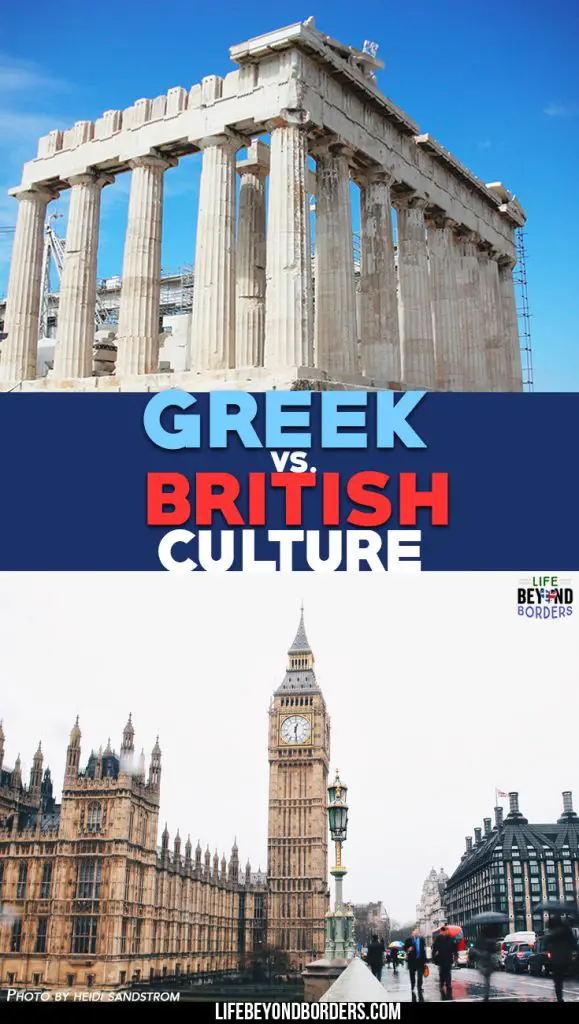The British vs Greek Culture debate could be considered by some as controversial. I’ll be looking at various topics that I consider make up cultural differences, and aim to look at why (even if there is a why). Therefore this post is purely subjective.
- Looking for Greece in the palm of your hand? My Greece’s Best Travel App for your iPad, iPhone or Android device will help you conveniently explore the country.
Take it as you will: tongue in cheek for some of the issues, or slightly more seriously. This is not a university dissertation. Either way, I hope it makes you think, maybe even smile.
Take a look at my Insider’s Guide to the Greek islands and be tempted to visit, as well as my Insider’s Guide to Visiting Athens for ideas of what to do on a city break, and my Greek Island Packing List for what to wear and pack when you do decide to visit. My free downloadable PDF link to this packing list is useful to print out.
British and Greek Culture: The Pub vs Coffee
It’s a well known fact that British people like to drink alcohol. This is a gross generalisation, so let me break it down.
A lot of cultures like to drink alcohol – but there are varying attitudes to it. Take this article, for example. The UK ranks lower than others in actual consumption of alcohol, but the quote:
Drinking yourself insensible is not only acceptable, it’s admired
is quite telling within British culture; it’s admired to drink yourself stupid. And it seems on the continent they’ve had enough of it too. This article shows us how, finally, the infamous resort of Malia in Crete has had enough of ‘Boozy Brits’ coming along and spoiling its image and is wanting to change that image.
Now then. Some of you may point out that the resort had been keen enough to profit from this booze culture in the first place – so it’s quite hypocritical of it to now have enough.
My question: well yes, they – and other resorts across the Mediterranean – have taken advantage of this. But that’s the whole point! There was the ability there in the first place to take advantage of Boozy Brits! If you like: Brits didn’t become ‘boozy’ just because of a resort in the sun and by the sea and sand. They brought their ‘booziness’ with them in the first place. (I am British by the way – before you think this is a ‘hater’ post). So I guess a more probing question is; where does this desire to want to get drunk in order to have a good time come from?

Also, I feel it necessary to add that I understand that not all Brits are boozy abroad. And that also there are some other Northern European cultures – or Australians – that can fall into that category too. But this article’s looking mainly at British and Greek culture.
If you’re interested to understand the cold weather and fewer sunlight hours study increasing chances of alcoholism, take a look at this scientific study here.
Let’s look at the ‘Coffee culture’ of the Greeks:

In my time living in Greece the difference I’ve noticed in British and Greek culture when it comes to socialising is;
- Greeks start to go out at approx. 11pm
- They won’t drink alcohol at home first with a ‘to get drunk’ attitude
- When Greeks go out, they will have eaten a (usually family) meal together first
- Alcohol, like wine, may be served with the meal – therefore it’s seen as a culturally acceptable drink, not something to get drunk on
- Greeks like to hang out in bars, sure. But they are also particular lovers of coffee. There are certainly more coffee shops per square mile than in the UK. And they will take their time nursing one coffee – maybe 3 hours or so. This is because they’re so busy chatting with each other.
- They will often go out in an evening to drink coffee too. Or if they do drink alcohol, there isn’t the thought process behind it that they will consciously make an effort to get drunk. It’s not ‘admired’, to re-quote from above.
To my mind, is seems the combination of sun and holiday ‘mode’ seems to do something to some visitors. OK – enough about the ‘drink to get drunk’ culture.
British and Greek culture: Food
In my experience, there is far less ‘fast food’ in Greece than in Britain. KFC: not many to be found (certainly not down your average high street), the same for McDonalds. In fact, the only time I grab a McDonalds is when I go to Athens International Airport.
Greeks will spend a long time over their food. A meal is not something to put into your stomach merely to fill it to ensure you get through the day. It’s something to be savoured and enjoyed…in fact, the Greeks really respect that ‘food is life.’

What do the Greeks eat? Well, I am impressed with their fast food of souvlaki and gyros: the former being chicken or pork meat served as small cubes on a stick with fries (‘proper’ fries i.e.: cut from real potatoes) and sometimes served on a pitta bread with salad and sauce such as tzatziki, the latter served exactly the same on a pitta, but it’s chicken or pork slices). Their ‘fast food’ is almost healthy!

Of course, there are so many other choices of food in Greece, but this is not the post for that. The point I wish to make is that I strongly believe that the Greek approach to mealtimes and fast food served is ‘healthy’ in so many ways. You can look at recommended Greek food blogs.
Are you tempted to holiday in Greece yet?
British and Greek culture: the language
It’s true when they say that language and linguistics can shape a culture. When I used to teach English in Greece, I first thought that they were being incredibly rude. Then I came to understand that it was language differences, not rudeness that shaped the people.
EG: Greeks don’t say ‘please’ and ‘thank you’ nearly as much as we do in the U.K. – and if you’re excessively polite in Greece, you’re considered, actually, to be someone not to trust. Think about it: what are you hiding behind that smile? Why do we use so many words in the UK to say what we really mean when a simple ‘Yes’ or ‘No’ will do?
For example:
Do you like my new hairstyle?
(Looks for a few moments)
No – I really don’t.
Hey, at least I know where I stand.
The Greeks will also shout a lot – even when they’re not angry. It’s a form of expression, along with:
- Backslapping
- Hugging (man to man and woman to woman as well)
- Kissing on both cheeks in greeting and goodbye (man to man and woman to woman as well)
- Saying what they REALLY mean instead of implying (see above example re: haircut)
- Using less words to ask for what they want, e.g.: “Give me that pen”
Once you’re used to it, you realise that in actual fact, you know where you stand much more quickly. There’s very little two facedness – if they don’t like you, they won’t bother you.
British and Greek Culture: flouting laws
Yep – the Greeks flouting even basic laws seems to be a national pastime, and one that I have mixed feelings about. There’s a great post here about the Top Non-Smoking Bars in Athens which the author interestingly felt she needed to write because, despite there being a non-smoking law in place in bars and cafes, you can bet your life Greeks don’t abide by this.

This is one thing I do miss about the UK, along with the fact that things seem to work in the UK. There are basic systems in place i.e.: if you’re fed up with receiving all these unsolicited calls from cold calling mobile phone companies, you can report them to a Watchdog of some sort. Things like this just don’t exist in Greece. I’m sick of my siesta being interrupted by a Vodaphone caller trying to persuade me to go onto their network.
Which leads me to:
British and Greek Culture: Siesta
Some people get irritated by the siesta culture – not just in Greece but the southern Mediterranean in general. I think it’s an essential part of life. First off, you have to understand how hot it gets in these countries, even with A/C. And I love that scientists have now proves that siesta is good for you. Hell, even when I come back to the UK, I take a siesta in the afternoon and I am much more productive in the late afternoon.
Don’t forget; southern Europe is an outside culture…their lives are led outdoors and the weather is conducive to that, so no huddling miserably looking at the rain from indoors. Therefore daily life starts early, shuts down in the scorching heat of the day and then back to work and finishes late in the evening.
Where else can you honestly say you can get a Dr’s or Dental appointment at 9pm at night, not intruding on your work day?

Have you travelled to Greece or Southern Europe? What have you noticed about the cultural differences? Share in the comments below.
PIN for later



Love it! The best part about travelling is seeing such differences. Travelling has not only taught me a lot about different cultures, it has also helped me see my own culture in a different way. Great post!
That’s right Anna. When you live in a different country to your own, you learn tolerance and also a new appreciation of your own.
Fun stuff Bex. I have never been to Greece but we visited Cyprus last summer, spending time in Nicosia for a full month. Huge Greek influence there. You had to take a siesta because from about 11 AM to 5 PM it reached 100 degrees F and often crept toward 105 during this 6 hour window. Desert environment. Maybe you could stay inside in the AC but there was nothing to do outside. Like during extreme cold days here in NYC.
Unless you’re from the Mediterranean, people don’t tend to understand the ‘siesta culture’ and how beneficial it is. Western cultures tend to have the impression that you’re only productive if you’re working 10-12 hours a day solidly, unfortunately.
Kefi. Philotimo. Greeks have a passion for life. I think you could explain those two words i have posted.. Would help your readers
Good idea Christina. Leave a Comment explaining Philotimo and Kefi to help readers of Life Beyond Borders. I love to encourage others to help my readers understand – thanks!
Just came across your article when browsing the XpatAthens website. Your salient comparisons between the two cultures is right on target.
The first thing visitors/tourists see and experience when in Greece is a totally different day to day life style. We Brits. (likewise other European and similar societies) tend to exist in a cocoon of control and conformity. It seems obvious then that our first impressions when visiting countries like Greece are that the people are so much more relaxed, lay-back, and tolerant and forgiving of life. It could be this is the very reason why the young Brits. in Malia go berserk and that more elderly people have a need to write about it all.
Digging deeper, I believe that there is a more fundamental difference between the two cultures. Greek history shows us that despite past territorial squabbles, the people have survived as a nation with, mostly, their traditions/cultures and attitudes intact. Sorry to say, not so GB. We have architecture, history, pageantry etc. but, lets face it, at a personal level, not much else.
I am an elderly person who has lived off and on in Greece for the past 50 years with my Greek wife. I am Orthodox for the past 35 years or so and have great regard for my wife’s family and also of course, my Greek friends and the people. I truly believe that one of the biggest and most endearing things that sets the character of Greece is it’s continued Christian faith. It still is a backbone of Greek society and is, mostly, still fundamental in family life.
Thanks for taking the time to stop by John and make some really pertinent observations. I’m glad you love Greece as much as I do.